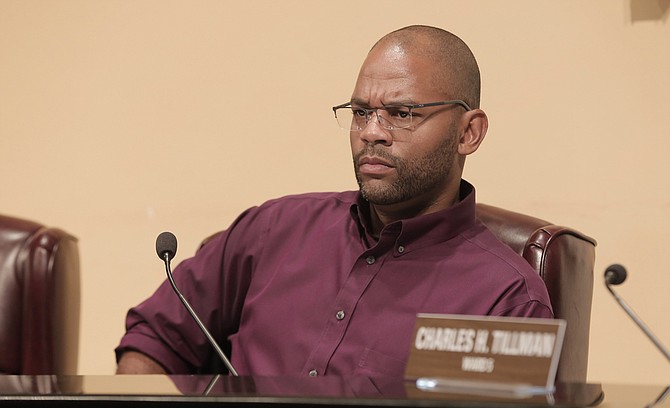The city council voted down Councilman De-Keither Stamps’ proposal to change government from a “strong mayor” to a council-manager approach. Photo by Imani Khayyam.
JACKSON — On a vote of 4-1, the Jackson City Council last week shot down Ward 4 Councilman De'Keither Stamps' proposed resolution supporting a citizen-led initiative to change the form of government from a "strong mayor" to a council-manager form of government. However, it isn't just the council that stands in the way of a change.
Stamps said during the council's last meeting on Oct. 18 that his point was to increase the authority vested in the council members. "Certain communities wanted representation," Stamps said. "And we got representation, but no power."
Pros and Cons
The City of Jackson has operated since 1984 with what is commonly referred to as the "strong mayor" form of government. The City government was expanded from three commissioners, who ruled as both legislative and executive branch, into seven wards, each with an elected council member, and a "strong mayor" who would hold all authority over the city departments. The state Legislature required that a popular referendum approve the change; Jackson approved it with 65 percent of the vote.
The newly formed city council's duties were to authorize expenditures and set the legislative agenda for the city, but the pace and rhythm of progress belonged to the mayor. Otha Burton Jr., the first chief administrative officer for the City in the new form of government, said it allowed for greater diversity in the representation in the mayoral administration and the council.
"I think it brought in four African Americans, and they were all elected in their wards," Burton, now the executive director of the Institute of Government at Jackson State University, said.
"And this was the first time any women were elected," Burton said. "People were excited about it."
The Legislature authorized the mayor-council form in 1973 and, as of 2014, 10 municipalities employ the strong-mayor structure: Bay St. Louis, Biloxi, Columbus, Greenwood, Gulfport, Hattiesburg, Laurel, Meridian, Tupelo and, of course, Jackson.
Now, Make Jackson Great Again, a group that former council candidate Corinthian Sanders leads, wants to change to a council-manager form, transferring oversight of departments to a professional municipal manager rather than the mayor.
Sanders said changing the form to allow for the hiring of a professional city manager would provide accountability.
"Look at us now; the state of our finances are in terrible shape," Sanders said. "[T]he council-manager type of government ... is a government that is competent, professional, vetted and trained."
In this form, the council would hold sway over the city manager, who would in turn oversee the day-to-day affairs of the municipal government.
Joseph Breen, executive director of the Stennis Institute, said each form of government has advantages and disadvantages, but that usually the form of government moved toward the strong-mayor form.
"Council-manager are usually practiced by cities from 10,000 to 100,000," Breen said, adding that it is usually a move of a smaller but growing town that needs a manager to handle growth.
"When you get larger than that ... we need that one person that all the people can look at and say I need change, and that is the strong-mayor form. You hope that one person can hear from the entire community and steer the council," Breen said, adding that council-manager is usually for smaller, more efficient governments.
Burton said the fast turnover of mayors in the City's recent future works against the advantages of a strong-mayor form of government, causing the bureaucracy to change every few years.
"From 2005 to where we are now, that's five mayors from 2005 to 2016 ... and each came in not building on any (mayor) prior to them," Burton said.
"You had more politics than any consistency than any administrative or political knowledge of what to do. If you get too involved in the political things, the electoral process, you don't get any continuity from any administration to the other."
"Our problem has been the turnover," Burton said. "Our problem is that we have lost a lot of institutional knowledge with this turnover we've had."
Long Road Ahead
Breen said changing to a different form requires signatures of eligible voters and then a majority of the vote on a referendum, both of which take time.
"One of the biggest hurdles to change is 10 percent or 20 percent (of the eligible voting population), depending on what form of government ... which is actually a bigger number than people understand," Breen said.
State law requires that 10 percent of the Jackson's population, or about 17,000 people, sign a petition to change to a council-manager form of government. The council would then have to authenticate and approve it. After that, the citizens would vote yes or no. The U.S. Census lists Jackson's adjusted projected population, rounded to the whole person, at 170,564, which means that over 85,000 votes are required to change the form of government.
"And, quite frankly, you are talking about a significant amount of time invested just to collect these signatures even if you have a huge push," Breen said.
More like this story
More stories by this author
- DA Smith Wins on One Count, But Passes on 'Whistleblower' Bad Check Claims
- Mayor Yarber, Socrates Garrett Address Contracting Dispute, 'Steering'
- UPDATED: Jury Finds Allen Guilty for Cell-phone Payment, Not Guilty on Nine Counts
- Allen Trial: Defense Rests After Making Case DJP Doesn’t Collect 'Taxes’
- DJP Board Attorney Gibbs Takes Stand to Defend Ben Allen's Actions


